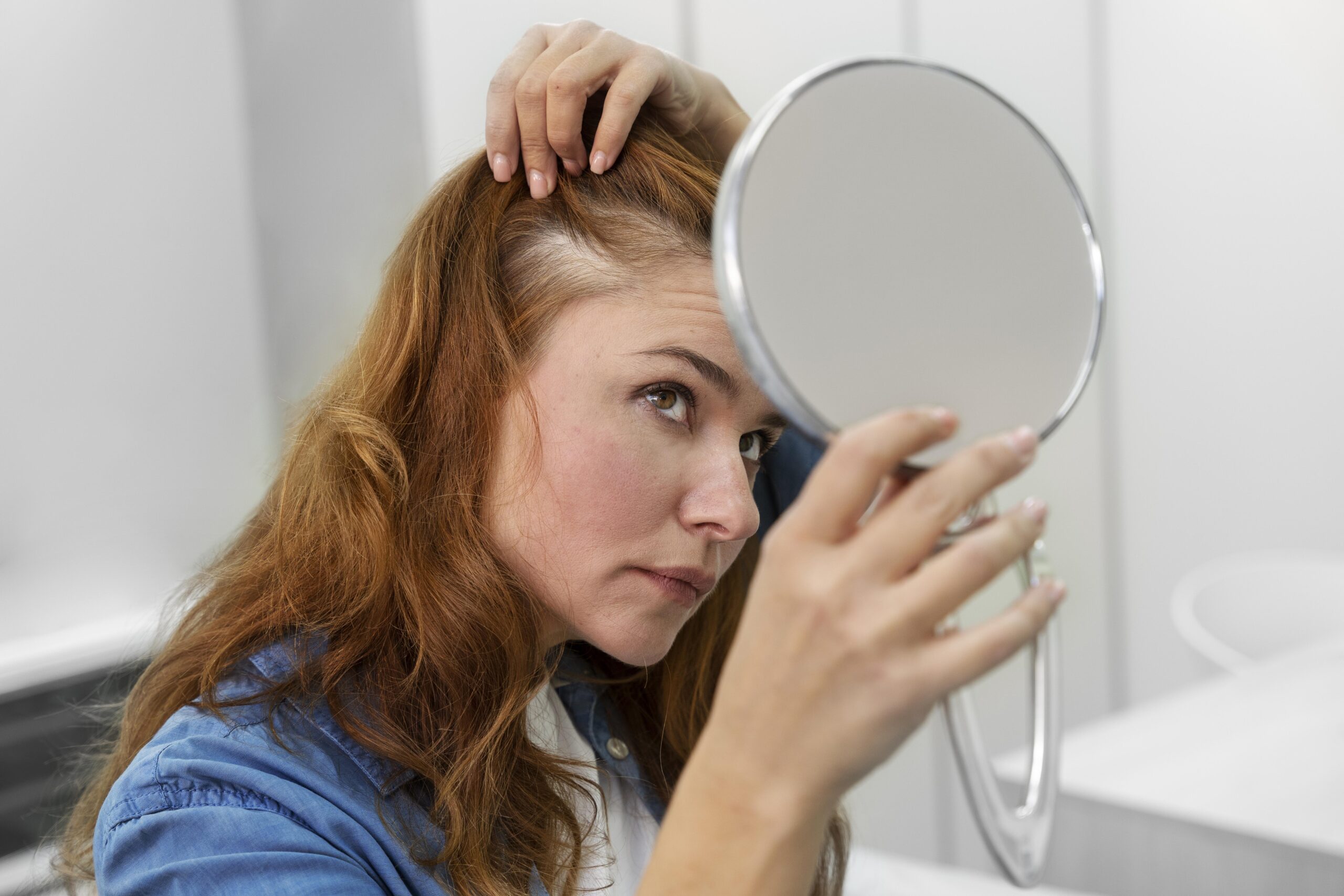How to Prevent Hair Fall in Winter Naturally

Winter brings cold winds and hair fall. How to prevent hair fall in winter naturally is a common concern that makes us feel bad. But there’s hope! Knowing why hair falls out in winter and using natural tips can help keep your hair healthy.
Winter is hard on our hair, making it dry and brittle. The cold and indoor heat take away moisture. This makes our hair break more easily. Genetics, diet, and stress can also make hair loss worse. But changing your hair care and lifestyle can help fight winter hair loss.
Key Takeaways
- Dry scalp and lack of humidity can lead to increased hair breakage in winter.
- Genetics and nutritional deficiencies can make individuals more susceptible to winter hair loss.
- Stress during the holiday season can impact hair health and contribute to shedding.
- Using the right hair products and maintaining a balanced washing routine are crucial for preventing hair fall.
- Natural remedies like oil massages and hair masks can nourish and strengthen hair during the colder months.
Understanding Hair Loss in Winter
Winter can be tough on your hair. The cold and dry air can make hair fall out more. But hair loss in winter is usually temporary and can grow back with the right care.
Dry Scalp and Hair
Dry scalp and hair are big reasons for hair loss in winter. Cold air takes moisture from your scalp, making it dry and itchy. This weakens your hair, making it break and fall out more.
Washing your hair with hot water also takes away natural oils. This makes the problem of dry scalp and hair worse.
Genetic Factors
Genetics can also play a part in hair loss, even in winter. If your family has a history of hair loss, you might lose more hair in the cold months. While you can’t stop genetic hair loss, good hair care and addressing other issues can help.
Nutritional Deficiencies
Your diet is key to healthy hair, and not eating right can lead to hair loss. In winter, we often eat comfort foods and forget about eating well. Not getting enough iron, zinc, and vitamins A, C, and E can weaken your hair follicles.
To fight hair loss from not eating well, eat lots of fruits, veggies, lean proteins, and healthy fats.
| Nutrient | Food Sources | Benefits for Hair |
| Iron | Leafy greens, lean meats, legumes | Supports hair growth and strength |
| Zinc | Oysters, nuts, seeds, whole grains | Helps maintain hair follicle health |
| Vitamin A | Sweet potatoes, carrots, spinach | Promotes scalp moisture and hair growth |
| Vitamin C | Citrus fruits, berries, bell peppers | Aids in collagen production for hair structure |
| Vitamin E | Avocados, almonds, sunflower seeds | Provides antioxidant protection for hair |
Stress and Its Impact
Stress can also cause hair loss in winter. The holiday season and work demands can make you stressed. Stress makes your body produce more cortisol, a hormone that can stop hair from growing right.
To fight stress-related hair loss, take care of yourself. Do things that relax you and make sure you sleep well each night.
Avoiding Heat Styling for Healthier Hair
Winter can be tough on your hair. It’s dry and cold. To keep your hair healthy, avoid using heat styling tools. They dry out your hair and make it break easily.
Try not to use heat styling tools. Instead, use methods that don’t use heat. This way, your hair stays healthy and strong.
Embrace Your Natural Texture
Learn to love your hair just the way it is. You don’t need heat tools to look good. There are many ways to style your hair without heat.
Try different products and techniques. Use leave-in conditioners, curl creams, or texturizing sprays. This will make your hair look great and keep it healthy.
Heatless Curling Techniques
Want curls or waves without heat? There are ways to do it. Try braiding your hair before bed. Let it dry overnight, then undo the braids for beachy waves.
You can also use foam rollers or twist your hair into buns. Let it air dry for soft curls. These methods are gentle on your hair and add variety to your look.
Limiting Hot Showers
Hot showers might feel good in winter, but they’re bad for your hair. They dry out your hair and make it break more easily. Try using lukewarm water instead.
Use a moisturizing shampoo and conditioner. This helps keep your hair healthy and strong. Avoid hot showers to protect your hair.
By avoiding heat styling, embracing your natural texture, and using heatless methods, you can keep your hair healthy in winter. Healthy hair comes from good habits. Take care of your hair and feel confident with your natural style.
Nourishing Your Hair from Within
Eating a balanced diet with lots of fruits and veggies is key for healthy hair in winter. These foods give your hair the vitamins and minerals it needs. This helps your hair stay strong against cold weather.
Hydrating Foods for Healthy Hair
Adding these hydrating foods to your diet can keep your hair healthy and moisturized:
- Leafy greens like spinach and kale
- Fruits such as berries, oranges, and melons
- Nuts and seeds, including almonds and chia seeds
- Fatty fish like salmon and tuna
- Lean proteins such as chicken and turkey
These foods are not just hydrating. They also have important nutrients for hair growth and less shedding in winter.
Essential Vitamins and Minerals
Some vitamins and minerals are very important for hair health. Make sure to eat foods rich in these:
| Vitamin/Mineral | Benefits for Hair | Food Sources |
| Vitamin A | Promotes sebum production, keeping the scalp moisturized | Sweet potatoes, carrots, spinach |
| Vitamin E | Improves scalp circulation and supports hair growth | Almonds, avocados, sunflower seeds |
| B Vitamins | Essential for overall hair health and strength | Eggs, whole grains, legumes |
| Iron | Helps prevent hair loss and promotes hair growth | Lean meats, lentils, spinach |
| Zinc | Supports healthy hair follicles and prevents shedding | Oysters, beef, pumpkin seeds |
Eating foods rich in these vitamins and minerals nourishes your hair from the inside. It helps your hair face winter’s challenges. Drinking lots of water is also key for a healthy scalp and hair.
The Benefits of Oil Massages
Regular oil massages are great for your hair, especially in winter. Warm oils like almond, olive, or coconut and massage them into your scalp. This boosts blood flow, moisturizes hair follicles, and helps produce natural oils.
Different oils have unique benefits. Coconut oil repairs hair damage and reduces protein loss. Olive oil deeply conditions hair and fights dryness. Argan oil helps frizzy, brittle, or dye-damaged hair, as shown in a 2013 study from Brazil.
Other oils like jojoba, avocado, and sweet almond offer benefits. They reduce protein loss and breakage and make hair more elastic and shiny. Essential oils like rosemary and tea tree help with hair growth and dandruff.
| Oil | Benefits |
| Coconut | Penetrates hair shaft, repairs damage, reduces protein loss |
| Olive | Deeply conditions, prevents weather-related dryness |
| Argan | Beneficial for frizzy, brittle, and dye-damaged hair |
| Jojoba | Reduces protein loss, thinning, and breakage |
| Avocado | Seals hair strands, prevents breakage |
| Sweet Almond | Protects against UV radiation, prevents dryness and brittleness |
| Grapeseed | Repairs frizz, split ends, and damage; enhances brightness and color |
| Macadamia | Fights frizz, repairs heat damage in thick hair |
| Baobab | Enhances elasticity and suppleness, seals moisture |
Hot oil treatments are good for textured or frizzy hair. They stimulate blood flow, encourage hair growth, and revive split ends. Treatments once or every other week are best, as daily treatments can strip hair of natural oils.
Regular oil massages can make your hair healthier, smoother, shinier, and straighter over time. Wash your hair before applying hot oil to let it penetrate deeply. This nourishes your hair from the inside, leading to luscious locks even in winter.
Addressing Underlying Causes of Hair Loss
Winter weather can make hair fall more. But health issues or medicine side effects might also cause it. If you lose a lot of hair in winter, see a hair expert. They can find and fix the main problem.
A trichologist can find out if stress, lack of nutrients, or health problems are causing your hair loss. They might suggest treatments or changes to help your hair grow. Some reasons for hair loss include:
- Vitamin deficiencies, particularly in vitamins A, E, and B
- Hormonal imbalances
- Thyroid disorders
- Certain medications
- Autoimmune conditions
Fixing these problems can help your hair stay healthy and reduce shedding in winter. Besides getting professional help, using home remedies to avoid hair fall can also help. These might include:
| Home Remedy | Benefits |
| Scalp massage with warm oil | Improves blood circulation and nourishes hair follicles |
| Balanced diet rich in vitamins and minerals | Provides essential nutrients for hair health |
| Reducing heat styling and chemical treatments | Minimizes damage and breakage |
| Using a humidifier | Combats dry air and prevents scalp dehydration |
Everyone’s hair is different. What works for one might not work for another. By getting help from a hair specialist and using the right home remedies, you can find a plan that works for you. This way, you can keep your hair healthy and shiny all winter.
How to Prevent Hair Fall in Winter: Hair Care with Home Remedies
Winter can be tough on your hair, leading to increased hair fall and dryness. But fear not, as there are several natural remedies you can try at home. These easy-to-make hair masks and treatments use ingredients readily available in your kitchen. They are both effective and affordable.
Natural Hair Masks
One of the best ways to nourish and hydrate your hair during the cold months is by using natural hair masks. These masks are packed with nutrients that can help strengthen your hair and prevent breakage. Try mixing mashed avocado, honey, and olive oil for a deeply moisturizing treatment.
Or combine yogurt, egg, and lemon juice for a protein-rich mask that can help reduce hair fall.
Aloe Vera and Lemon Juice Treatment
Aloe vera is known for its soothing and hydrating properties, making it an excellent ingredient for a winter hair treatment. Mix aloe vera gel with a few drops of lemon juice and apply it to your scalp and hair. Leave it on for 30 minutes before rinsing off with lukewarm water.
The aloe vera will help moisturize your hair, while the lemon juice can help remove buildup and promote a healthy scalp.
Banana and Egg Hair Pack
Bananas are rich in potassium, vitamins, and natural oils that can help nourish and strengthen your hair. Mash a ripe banana and mix it with an egg, a tablespoon of honey, and a few drops of olive oil. Apply the mixture to your hair and scalp, and leave it on for 20-30 minutes before washing it off with a mild shampoo.
This banana egg hair pack can help reduce hair fall and leave your hair looking shiny and healthy.
By incorporating these natural remedies into your winter hair care routine, you can help prevent hair fall and keep your locks looking their best. Remember to be gentle with your hair, avoid excessive heat styling, and nourish your body with a healthy diet for optimal hair health.
Maintaining a Balanced Washing Routine
In winter, finding the right balance in hair washing is key. Washing too much can dry out your hair. Not washing enough can cause scalp buildup and irritation.
Avoiding Over-Washing
Try to wash your hair every 2-3 days. This lets your scalp’s oils nourish your hair. Use a gentle, sulfate-free shampoo to keep your hair’s oils.
Recommended Washing Frequency
How often you wash your hair depends on its type. Here’s a simple guide for winter:
| Hair Type | Washing Frequency |
| Fine, thin hair | Every 2-3 days |
| Medium, normal hair | Every 3-4 days |
| Thick, coarse hair | Every 4-7 days |
| Curly, kinky hair | Every 7-10 days |
Pay attention to your hair and scalp. Adjust your washing as needed. If your scalp is oily or itchy, wash more. If your hair is dry, wash less and use deep conditioning treatments.
By avoiding overwashing, you can keep your hair healthy and moisturized in winter. Try different washing frequencies and products to find what works best for you.
Humidifiers: A Surprising Solution
Humidifiers can help prevent hair fall in winter. Indoor heating makes the air dry. This pulls moisture from your hair, making it brittle and prone to breakage. Humidifiers add moisture back into the air, keeping your hair healthy and shiny.
Most people use conditioner a lot in winter. But humidifiers are just as important. They keep your home’s air moist, fighting winter’s dryness on your hair.
Experts say to keep your home’s humidity between 30% and 50%. This is good for your hair and health. Choose a humidifier that fits your room size and needs.
To protect your hair in winter, you can also:
- Reduce heat styling to avoid damage
- Get deep conditioning treatments often
- Wash your hair with lukewarm water, not hot
- Wear a silk or satin hat to protect your hair
Using a humidifier and following these tips can help prevent hair fall. You’ll keep your hair healthy and shiny all winter.
| Winter Hair Care Tip | Benefit |
| Use a humidifier | Maintains proper moisture levels for hair health |
| Reduce heat styling frequency | Avoids damage and breakage |
| Get deep conditioning treatments | Nourishes and strengthens hair |
| Wash hair 2-3 times per week | Prevents stripping natural oils |
| Use a silk or satin-lined hat | Protects hair from elemental damage |
Frequently Asked Questions
What causes hair loss during the winter months?
Hair loss in winter can happen for many reasons. These include a dry scalp from low humidity and genetics. Also, not getting enough nutrients and stress from holidays can play a part.
How can I protect my hair from winter dryness?
To keep your hair from getting dry in winter, don’t use hot styling tools. Let your hair be natural. Try braids or rollers instead of heat. Also, take shorter hot showers to keep your hair from breaking.
What foods should I eat to promote healthy hair growth?
Eating foods that keep your hair hydrated is key. Include fruits and veggies in your diet. Also, eat lean proteins, vitamin A, vitamin E, and vitamin B for strong hair.
Conclusion
Using a good routine of hair care with home remedies can stop too much hair fall in winter. Knowing why hair falls out more in winter helps. This includes dry scalp, genetics, not enough nutrients, and stress.
Embrace your natural hair type and avoid too much heat styling. Eating foods that keep hair moist is also key. These foods should have important vitamins and minerals.
Oil massages with oils like coconut and aloe vera can make hair stronger. They help hair grow and stop falling out. It’s important to pick hair care products that fit your hair type. A pro can help you find the right shampoo and conditioner.
Natural hair masks with ingredients like banana and honey can add moisture. They make hair healthier in winter.
Washing hair right, protecting it from cold, and using a humidifier help. Getting regular trims every 6–8 weeks stops breakage. This keeps hair healthy all year.
By following these hair care tips for winter, you can fight winter’s hair challenges. Enjoy beautiful, healthy hair all year with these natural methods to prevent hair fall in winter.
For a variety of content focused on natural and herbal remedies for various healthcare concerns, please visit: Pure Remedy Solutions









